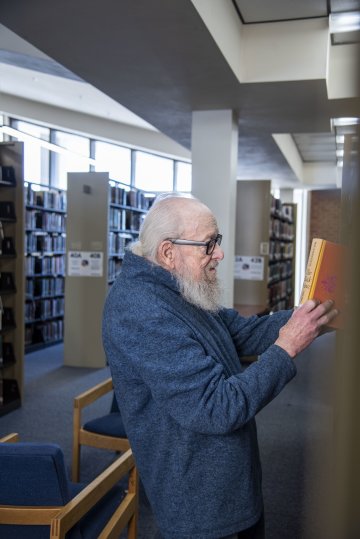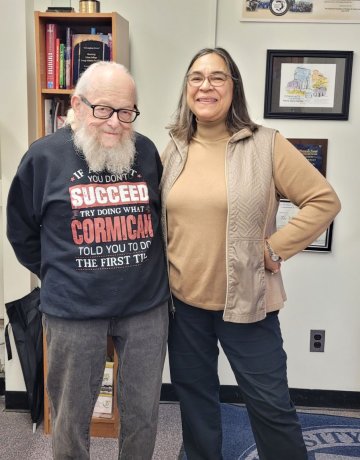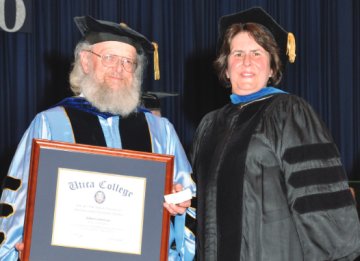
The World According to Cormican

Utica's most beloved non-conformist retires after 50 years of teaching

He taught his first class when he was a freshman at Jefferson Township High School back home in Indiana.
Not an English class, mind you. No, John Cormican – who announced his retirement over the Fall semester – began his remarkable decades-long teaching career helping his teenage classmates master the fine points of forestry. For anyone who doesn’t know John, this might seem a strange starting point for a professor so deeply associated with
Utica University’s English major and its linguistics curriculum.
But virtually none of John’s many colleagues, friends, or former students would find this at all surprising.
In the 1950s, interscholastic academic competition in Indiana was as spirited as league athletics, with county matches, sectionals, regionals, semi-finals, the works, and Jefferson Township High punched well above its weight in the agricultural fields, including forestry.
John had ranked first in the county competition in seventh grade and was generally considered a star in forestry. When he entered ninth grade, his ag teacher, George Frick, asked him to instruct the school’s forestry team.
“He told me, okay, the team is yours. You teach them what they need to know,” says John. “So I did. Seven of the top ten kids in the county were my kids. My junior year, our team was number seven in the state, and I was number three in the state. In forestry.”
Both a teacher and a student. Embodying multiple, often conflicting identities has been a running theme for John since those early days. “I don’t fit neatly into people’s categories,” he says. “And I kind of like not fitting in.”
Up from Upland
Upland, Indiana – the tiny farming community where he was born – earned its name for being the highest point on the Pennsylvania Railroad between Chicago and Cincinnati. It was home to the only high school that served both Jefferson and neighboring Monroe townships. And though John had sixty classmates in seventh grade, his graduating class numbered only thirty-seven. “There were a lot of dropouts or force-outs, because the teachers were kind of cruel,” he recalls.
“I don’t fit neatly into people’s categories. And I kind of like not fitting in.”
Aside from forestry, John placed high in other subjects as a high schooler, competing statewide in English and algebra, and taking the bronze in geometry at one competition. He was an academic star at Jefferson Township High, though he in part attributes his success to being a big fish in a very small pond.
John enrolled at Ball State University after graduation with the goal of becoming a secondary school teacher. Modern English grammar – a course he has taught at Utica for five decades – was a requirement for English majors at Ball.
“It happened that the chairperson of the department taught modern English grammar,” says John. “On the first day in class, he was tossing an eraser and saying, ‘What’s the grammar for this?’ And people were saying, you tossed the eraser; the eraser was tossed by you, whatever. Everybody gave an answer, and he wasn’t happy with any of them. I didn’t normally stand out in classes or say anything, but I couldn’t stand this craziness, so I said, ‘There’s no grammar for that.’ And he said, ‘You are right!’”
John aced the course, and it proved something of a turning point for him. Up to that time, his mind had been set on literature, but the fact that he had excelled at English grammar when about a third of his classmates failed the course made him reconsider. “I thought, okay, if I understand this and I can do this, maybe this is what I should do,” he says. When he studied for his masters, John served as the chairperson’s graduate assistant and was hired as an instructor soon thereafter. At the time there was a shortage of English teachers at Ball State. He recalls the deans inviting the brighter students – including himself – to dinner and encouraging them to teach English at the college rather than taking posts as secondary school teachers. John agreed. “I was the youngest and lowest paid faculty person on campus,” he recalls. “At the same time, I knew I was going to work on a Ph.D., and I was taking freshman foreign language courses with the freshmen. So nobody was sure if I was a teacher or a student, because I’ve always been kind of
ambiguous.”
With job offers in both Puerto Rico and South Carolina, John chose Benedict College. “I figured I could walk out of South Carolina,” he says.
John applied to the Ph.D. program at the University of Michigan. The program had a foreign language requirement but wouldn’t accept his minor in Spanish and graduate credits in Spanish literature, a decision that rankles him to this day.
“Am I still pissed off about this? Yes! I had to learn effing French and German. They didn’t consider Spanish a literary language, despite Cervantes and all this stuff. I had credits in Spanish poetry, so I think I should know, but okay, it doesn’t exist,” he says, laughing.
His graduate journey was very much a tale of two cities. He worked on his Ph.D. at the campus in Ann Arbor while teaching full-time at the University of Eastern Michigan in Ypsilanti, seven miles away. At that time there was a surplus of U of M doctoral students doing the same thing, so the institution adopted a policy of firing students once they earned their degrees. As a result, John found himself on the job market when he finished at Michigan, searching for a teaching position at a time when there was a surplus of English PhDs vying for a limited number of openings.
He got job offers from two colleges – one in South Carolina, the other in Puerto Rico. His reason for choosing the former was entirely practical. “I figured I could walk out of South Carolina and I couldn’t walk out of Puerto Rico, so I took the job there,” he says.
From Benedict to Utica
John began his teaching career in earnest at Benedict College, the renowned HBCU in Columbia, South Carolina. He liked the students, got along well with the administration, and even met his wife Elin there, who was teaching human services and social work at Benedict. But it wasn’t long before he knew he had to move on. For one thing, the deep south climate did not agree with him all that well, and he was starting to have some health issues. More importantly, though, he was being pressured to take on administrative responsibilities, and he was determined to remain focused on teaching.
The final straw came when John got a call from his dean while he and Elin were back in Michigan between semesters for their wedding.
“My publications, while respectable, really aren’t that important. It’s the influence I have on students that’s important.”
“The school had gotten this big grant and they wanted me to be the director,” he says. “I said, no, I’m not an administrator, but when I got back they said, you’re the director – nobody else can do it. I did not apply for the position. The search committee chair said, we’ll give it to you anyway. I said, like Sherman, if nominated I will not run, if elected I will not serve. It was time to get the hell out of there.”
Fortunately, it turned out that one of the schools he had originally applied to was still in search of an English professor – a small, private institution in upstate New York named Utica College. After he had already accepted the job at Benedict, Jerry Cartwright, then the English chair at Utica, had called him to try to set up an interview. John renewed his application to Utica and heard back from the new department chair, Frank Bergmann, who told him, in essence, not to get his hopes up.
“Frank had written me that I wasn’t his preferred candidate, which is, okay, kind of strange,” says John. “I was at a convention in Chicago where people go to find jobs, staying at a hotel, and I got a call from Amby [Ambrose] DeFlumere, then the president of Utica College, saying that Frank had asked him to check me out when he was there. And I said, uh, okay, I’ll come over to your hotel. He said, ‘No, I’ll come over to yours.’ I thought, okay, that’s not the way it’s usually done, but that’s fine.”
President DeFlumere arrived at the hotel, invited himself up to John’s room, and conducted the interview there. When the conversation was wrapping up, John told DeFlumere that he really didn’t understand what this interview was about, since Frank Bergmann had already told him that he wasn’t his first choice. “I don’t know anything about that,” the President replied. “He just told me to check you out.”
John eventually was invited to Utica to meet with the search committee and – as he describes the experience five decades later – proceeded to explain to them why he might not be the person they were looking for … at least not yet.
“As they were talking about the position, I said, I think you want a sociolinguist, and I’m not one, but I can read,” he says. “So basically I turned myself into a sociolinguist.”
Long after he joined the faculty at Utica, one comment from the search committee interview continued to puzzle him. “At one point in the interview, Virgil Crisafulli said, ’You know, Utica is not Harvard.’ I thought to myself, yeah, I know – Harvard is in Boston and we’re in Utica, New York,” says John.
The mystery was solved for him three or four years later, on one of the occasions when New York State was looking at incorporating Utica into the SUNY system. John recalls Dr. Crisafulli suggesting in College Council – the predecessor body to Faculty Senate – that they should consider the offer.
“Cris said, ‘State colleges aren’t all bad. After all, Michigan is the Harvard of the west.’ And I thought, oh right … University of Michigan, Harvard – now I understand what he had meant.”
Putting students first

John arrived at Utica at a time when many of the College’s original professors were still teaching – Crisafulli, Ray Simon, Jake Oser, and others. It was a smaller institution then, and the faculty interacted at a much more personal level than is possible at a growing university with multiple locations and hundreds of full- and part-time professors. “When I first got here, we would go to retirement gatherings for faculty in different departments,” he says. “People, when they had been here for a while, would always invite new faculty to their homes for dinner, as I did. We stopped doing that twenty or twenty-five years ago because it got too cumbersome.”
He has, throughout his tenure, been an active member of the Utica University faculty and a trenchant voice in campus conversations about issues facing the institution over the decades. Among his chief accomplishments as a member of the curriculum committee was the establishment of Utica’s first academic minor – the minor in English language, which he argued would allow students to acquire a useful credential. It is still part of the University’s program listing, along with the nearly sixty other minors that have been added since.
In many ways, John is an old-school academic with an impressive range of knowledge across multiple disciplines, but his focus has always been on teaching. “My publications, while respectable, really aren’t that important,” he says. “It’s the influence I have on students that’s important.”
He remembers many of his students from the early years going on to successful careers in a variety of fields, some earning advanced degrees in English and teaching at institutions all over the country. Ann Marie Ade, an associate professor at Embry Riddle in Florida and a Cormican alumna, sent him a Christmas card last December telling him how she strives to emulate his passion and compassion when teaching her written communication classes. “Ann says her brother-in-law and niece see me at hockey games, so
she knows I’m still alive,” he says.
His former students on the Utica University payroll alone could fill a small lecture hall. The short list includes Dorothy Obernesser, Polly Smith, Mary Hayes Gordon, Rich and Melissa Racioppa, Mary Siniscarco, Dave Fontaine, Kelly Adams, Alison Ricci-Wadas, and Brain Marcantonio, among many others.
“I often say, so and so is my student …like most people in the world,” says John.
As much as he is associated with the junior and senior-level linguistics courses he teaches, John admits to a marked preference for working with first-year students. Even now, officially retired, he continues to teach comp 101 as an adjunct alongside his upper-level courses, a 50-50 split he can trace back to the courseload requirements articulated in his appointment letter in 1974.
“The truth of the matter is, I like interacting with first-years,” he says. “You can have more impact on them than you can on more advanced students. It’s more fun. They’re still shockable. It probably has more impact on them than the upper-level classes do.”
Students are generally less gregarious than they used to be, John says, partly due to the shift toward online learning during the pandemic. He recalls one class he had a year or so after the COVID-19 shutdown that bucked the trend. “There were a lot of baseball players, all about six-foot-two, good students, articulate. I remember walking into the classroom and they were all talking, and I said, you know how happy this makes me? You guys are actually talking to each other!”
“I’m conservative in terms of academia, but I’ve always been liberal as hell on social issues. Sometimes they conflict.”
Still, he finds that he is frequently covering very basic principles in English 101, as many recent high school graduates – particularly post-COVID – are unacquainted with concepts as foundational as a thesis statement, a sentence fragment, or a comma splice.
Students – and, indeed, the world they live in – have changed a great deal since his arrival at Utica, and while he has remained a fully analog teacher in a digital age, over time he has adjusted his curricula to meet the demands of the current moment. He finds, for instance, teaching Modern English Grammar a very different project now than it was decades ago. “The students used to have to unlearn the stuff they learned in traditional grammar. But kids have had no traditional grammar in years, so now they don’t have anything
to unlearn,” he says.
While many academics blame such gaps in knowledge on the students themselves, John – unsurprisingly – has an entirely different take on this issue.
“Let’s focus on who’s responsible and who’s not responsible,” John says. “Blaming the kids is not really fair to them. The schools didn’t teach them what we think they should know. You can’t fault the kids for not knowing something if the schools and the teachers didn’t teach them.”
Small-c catholic
In some ways, being a lifelong contrarian has enabled him to adjust to changes in language usage perhaps more easily than the average octogenarian. During the interview for this article, he opens a blue book and reads a marginal comment he wrote to the student essayist regarding the use of “they” as a singular pronoun:
Pronoun antecedent agreement
– If you want to use “they” or “their” as singular rather than plural, mark it with an asterisk so that I know that it is intentional and you are aware of the issues involved. Some (but not all) LGBTQA+ people prefer it, but some employers do not accept it.
“I’m conservative in terms of academia, but I’ve always been liberal as hell on social issues,” he says, smiling. “Sometimes they conflict, so I try to straddle the fence and say, okay, I’m going hold you to everything, but if you want to make a political statement, I will accept that and not consider it an error. But I want you to be aware of it. And if you mark it with an asterisk, that acknowledges you know you’re doing it intentionally for a purpose.”
John has always been adept at meeting students where they are. Perhaps his tendency to blur the lines between his various roles and identities, defying easy categorization, has made this task simpler. Whatever the reasons may be, he has left an indelible impression on generations of students.
“John Cormican changed the way I talk,” says M.J. Allen ’24, a recent graduate of Utica’s English program, now a human resources officer at the Arc of Central New York. “It blew my mind what he taught in linguistics – I had taken it over the summer, and it totally changed my perspective on how I speak and every single word that I say. I feel that I am a lot more eloquent now, since having him. He is a great professor. I really enjoyed him. He is a sweetheart.”
A couple of years ago, one of his English 101 students approached him in class with a question. “This may be a rude question,” he said, “but how old are you?”
“I said, yeah, it’s kind of rude, but I just turned eighty-two about a week ago,” says John. “The student asked, ‘Why are you still here?’ and I said, well, I get to hang out with young people.”
And at eighty-four, he insists that he still learns from his students. “One time when they weren’t paying attention, I tossed something out to them, and one of the students asked, ‘What is the meaning of life?’ I thought about that for a moment and told them that I think the meaning of life is trying to make the world a better place when you leave it than when you found it. And I hadn’t really thought about it before, but that is kind of my philosophy of life,” he says.

John associates this with the Jewish concept of Tikkun olam, repairing the world, which in modern times denotes building a better world through social justice and acts of compassion. A Catholic with a deep intellectual interest in religion and philosophy, he has often been misidentified as belonging to other faith traditions as well as other ethnicities.
“One of my colleagues at Benedict asked me if I was Jewish,” John recalls. “I told her, only socially, because most of my friends in grad school were Jewish and I dated an Israeli girl for a couple of years. She didn’t know what the hell I meant, but that’s okay.”
Once during the Arab Spring, when the Syrian civil war was just getting started, John was at a local Middle Eastern restaurant he frequents when the owner approached him with a $500 check for the Syrian Relief Fund. “I said, I don’t know who you think I am … but I am not who you think I am,” he says.
Perhaps one of the best expressions of his non-conformity was his and Elin’s wedding in Michigan, which he says was thrown together in three weeks. Elin’s Lutheran pastor from New Jersey came to help officiate. He and the Catholic priest had a brief discussion and proceeded to perform a consolidated Catholic/Lutheran mass which neither church would have approved of at the time. John smiles as he recalls one of his Jewish friends bringing bread and wine for the altar and his Methodist relatives and Episcopalian friends taking communion.
And though technically retired, John is now teaching sections of Modern English Grammar, History of the English Language, and Written Communication as an adjunct. So … both a working professor and a retiree? It’s just the next chapter for Utica’s quintessential non-conformist.
“I’m catholic in the small-c sense of universal,” he says, laughing. “Isn’t that a crazy life?”
More Stories

Dr. Rutal Mahajan Earns NVIDIA Generative AI Certification
Rutal Mahajan, assistant professor of computer science, earned Nvidia Generative Artificial Intelligence (AI) Large Language Models (LLMs) Certification at Nvidia’s...

Students, faculty, and staff ring in the season with annual Holiday Dinner
The holiday season is here once again and before the semester draws to a close, the campus came together to...

Utica University Chosen as a Regional Site for Mock Trial National Championship Tournament
The American Mock Trial Association has selected Utica University as a National Championship Tournament regional host site. The AMTA hosts...
I would like to see logins and resources for:
For a general list of frequently used logins, you can also visit our logins page.
